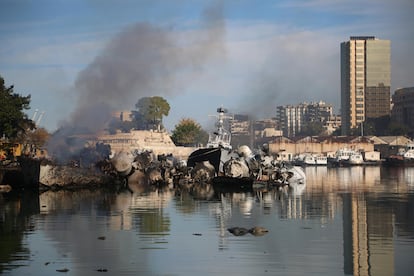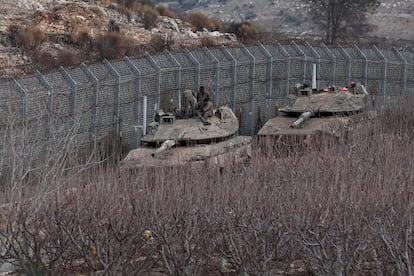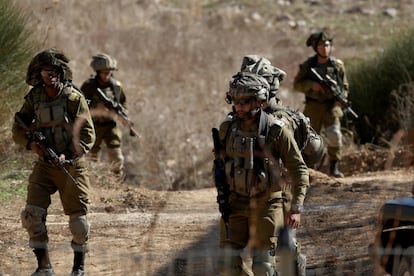Israel takes advantage of Assad’s fall to gain ground in Syria: ‘We got rid of one problem and woke up with another’
Israeli forces have entered the Arab country for the first time in half a century to try to prevent the new authorities from using military capabilities against the Jewish State

Ahmed smokes with a trembling hand and nervously moves his foot. He is 27 years old and has just arrived from Hurriye, one of the villages in the demilitarized zone in Syria that the Israeli army has rushed to penetrate for the first time in the last half century, taking advantage of the confusion following the fall of dictator Bashar al-Assad on Sunday. An hour earlier, he explains, the village chief had communicated to the residents through the mosque’s loudspeakers the order he had just received from the Israeli army: they had one hour to leave.
“I was working, so I took my wife and children and came here in the same clothes,” he says, pointing to his mud-stained boots. He is a livestock farmer and his mind is more on his cows and sheep, which he left behind without knowing who will feed them, than on future plans. “What was I going to do? Stay? That’s all there was. I have no plan… we will sleep here today.” When he says “here” he is referring to the nearby village of Shahda, where Israeli troops have not yet arrived, but a few hundred metres away — in a straight line on the same road — a tank can be seen, which worries both young and old because no one knows what it will do in the coming days: advance, stay, or retreat.
The incursion into Syria in recent days is Israel’s third ground operation since October 2023, after Gaza and Lebanon, accompanied by unprecedented naval and air strikes (350 in just 72 hours) that have been overshadowed by the celebration of the Syrian rebel offensive that put an end to 13 years of civil war.
“The Israelis have spoiled our joy at Assad’s departure. The whole of Syria is celebrating, except for us. To me, they are all the same,” says elderly Ibrahim Yarida. Yawal Awuad, 49, agrees: “They didn’t even give us five hours to celebrate Assad’s departure. We got rid of one problem and woke up with another. Now we are worried that they will come here too.” Locals have placed three garbage containers in the middle of the road so that no one goes further and runs into the tanks.
They talk in a car repair shop, around a diesel stove with a can of sunflower oil filled with water. It is the only way to wash one’s face and hands with hot water, in a rural area in a country where 90% of the population lives below the poverty line, according to UN data. Between villages, one sees only flat, rocky land without crops and, from time to time, the odd shack.
Israel has basically rushed to take advantage of the power vacuum to ensure that there is nothing left for anyone to obtain to attack Israel one day, accompanying the ground advance with an intense wave of bombings. On Tuesday, the Israel Defense Forces (IDF) announced that in the space of 48 hours they had destroyed “most of the strategic weapons depots in Syria, preventing them from falling into the hands of terrorist elements.” It is, as the military correspondent for Israeli television station Channel 12, Nir Dvori, pointed out on Monday, an operation “designed to ensure that whoever ends up taking the reins of Syria, it will take a long time to rebuild the country’s military capabilities.” “Whoever follows al-Assad’s footsteps will end up like Assad did,” warned Israeli Defense Minister Israel Katz.

Not in half a century, since the Yom Kippur War in 1973, has Israel established a presence on Syrian soil, despite frequent violations by both sides during the civil war, which were allowed to pass unnoticed because they were linked to the fighting. Entering Syrian territory is expressly prohibited by the armistice, which — like all agreements between states — has a validity that transcends the government in power. Israeli Prime Minister Benjamin Netanyahu, however, considers it void following the ouster of Assad. “We want correct relations with the new regime in Syria. But if this regime allows Iran to re-establish itself in Syria, or allows the transfer of Iranian weapons or any other weapons to Hezbollah, or attacks us, we will respond forcefully and we will exact a heavy price from it,” declared the Israeli prime minister.
The Assad regime was hostile and allowed (voluntarily or passively) the passage of weapons from Iran to Lebanon for Hezbollah, but limited itself to diplomatic complaints about the countless Israeli air strikes in Syria (with the green light from Russia) against targets linked to Tehran. And, above all, it was predictable, unlike the horizon dawning on the country following the offensive led by Islamic fundamentalists Hay’at Tahrir al-Sham.
No one says it, but a doubt seems to float in the air among those who welcome Ahmed, as always here, with a cup of coffee: Will he ever set foot in his home again? Everyone feared what Israel officially announced a few hours later: it intends to establish a “sterile zone” to prepare for a prolonged presence.
Israeli troops are present in Shahidiye. One of the residents, Abu Ali, says by phone that the military has asked all residents to remain calm, but not to leave their homes under any circumstances. “How could we not do that? The electricity comes on for about 15 minutes and then it goes off. There is no water. They have brought some food through the United Nations,” he protests.
Shahidiye residents are uncomfortable with their new reality. Not so much the nearby presence of the tank or the punctual sound of gunfire, but the constant buzzing of Israeli drones overhead. Abu Uyud says that “they have been heard occasionally” since October 2023, when Hamas attacked Israel and pro-Iranian militias in Syria opened a front with occasional attacks. “They would come, take pictures, and leave. Now it is like this all the time. It drives me crazy,” he adds.

Major military operation
Israeli forces have destroyed, among others, 15 Syrian navy vessels in the ports of Al Bayda and Latakia and dozens of air-to-air missiles with ranges of up to 190 kilometers (118 miles), according to the military statement. It was one of the largest operations in the history of the Israeli Air Force. The fighters, it added, have flown over Syrian airspace for “hundreds of hours,” during which they can be heard passing by, their trails seen, or their bombs heard, particularly in the early hours of Tuesday.
IDF troops have penetrated some 15 miles (according to locals) into the demilitarized zone, which was established by a UN resolution in 1974, almost a year after the Yom Kippur War, to delimit an area where any military presence or heavy weapons other than the 1,200 or so blue helmets who guard it are prohibited. It is 50 miles long, between the border with Lebanon (where it reaches six miles in width) and that of Jordan, where it narrows considerably and can be barely 500 meters wide. It is delimited by two lines. To the west, Alpha, on the border with the Golan Heights (territory that Israel occupied in the Six-Day War of 1967 and then annexed). To the east, Bravo, already inside Syria.
It is policed by UNDOF, a small, little-known UN peacekeeping force. It now also has an uncertain future. The danger has caused several countries to withdraw and UNDOF now has just over 1,100 soldiers and 100 civilians from 13 countries. It is, for example, one-tenth the size of UNIFIL, which polices neighbouring southern Lebanon, from which Israel is due to withdraw its troops within the next month and a half under a ceasefire agreement.
But there are Israeli soldiers and heavy weapons between Alpha and Bravo. The UN has protested, so Sheikh Chaher took his car and went to speak to a representative of the UN mission on Monday. He takes out his cell phone and shows a video of the conversation. “I told him: Iran is gone, Hezbollah is gone. Why are the Israelis opening fire on people? ‘Because they are afraid that Hezbollah is there,’ he replied. It is no longer in Syria. If anyone in the village is shooting here now, it is in the air, out of joy that Assad is gone.”
As he was not satisfied, and the IDF was entering more and more villages and beginning to order forced displacements, he ignored the danger and tried to approach the Israeli position to speak directly with the soldiers. He says that the commander, surprised, simply told him: “Ok, ok, yes, we also want peace.”
The Israeli narrative about the ground invasion has changed in just three days. First, the army issued a statement saying its troops were helping the UN peacekeepers repel an attack that the UN mission did not confirm in its statement. A day later, it reported its penetration into Syrian territory, the first in half a century, without going beyond the demilitarized zone. Netanyahu issued two statements to defend it. In English, he called it a “temporary” measure. In Hebrew, he did not use the word.
Syrian transitional government appoints Mohamed al-Bashir as interim prime minister
The new Syrian transitional government has named Mohamed al-Bashir as interim prime minister to lead a process that should conclude on March 1, 2025, he announced himself on Tuesday in a press conference. Since January, Al-Bashir held the same position in the so-called National Salvation Government, the parallel government of the Hay'at Tahrir al-Sham organization, which led the offensive against the ousted Syrian regime, in its stronghold of Idlib, in northwestern Syria.
Originally from that same province, where he was born in 1983, Al-Bashir is an electronic engineer. He made the leap into politics after the popular uprisings of 2011 against Assad, which were harshly repressed by the regime. The new interim prime minister has described his government as "a government of salvation," made up of an undetermined number of ministers, whose identity will be revealed later, he said.
Sign up for our weekly newsletter to get more English-language news coverage from EL PAÍS USA Edition
Tu suscripción se está usando en otro dispositivo
¿Quieres añadir otro usuario a tu suscripción?
Si continúas leyendo en este dispositivo, no se podrá leer en el otro.
FlechaTu suscripción se está usando en otro dispositivo y solo puedes acceder a EL PAÍS desde un dispositivo a la vez.
Si quieres compartir tu cuenta, cambia tu suscripción a la modalidad Premium, así podrás añadir otro usuario. Cada uno accederá con su propia cuenta de email, lo que os permitirá personalizar vuestra experiencia en EL PAÍS.
¿Tienes una suscripción de empresa? Accede aquí para contratar más cuentas.
En el caso de no saber quién está usando tu cuenta, te recomendamos cambiar tu contraseña aquí.
Si decides continuar compartiendo tu cuenta, este mensaje se mostrará en tu dispositivo y en el de la otra persona que está usando tu cuenta de forma indefinida, afectando a tu experiencia de lectura. Puedes consultar aquí los términos y condiciones de la suscripción digital.









































